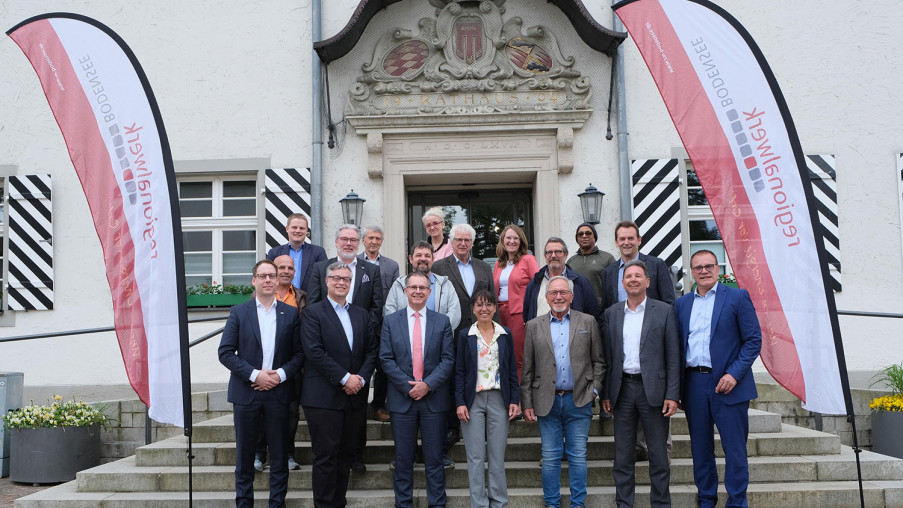ENGIE Deutschland realizes green heat supply for Tettnang
- The town of Tettnang, Baden-Württemberg, will in future benefit from a heat supply from 100 percent renewable energy for 14 public buildings
- To this end, ENGIE Deutschland and Regionalwerk Bodensee are founding Wärmeversorgungsgesellschaft Tettnang GmbH and jointly building a local heating network with a capacity of up to 14.1 megawatts
- The energy supply contracting agreement (heating) with the town of Tettnang runs for a period of 20 years; the concept also provides for an extension of the network to neighboring residential and commercial areas
Cologne/Tettnang - How do cities and municipalities set up their heat supply systems sustainably for the future? The town of Tettnang in the Upper Swabian Lake Constance district with a population of 20,000 is also facing this challenge in the context of the municipal heating transition - and is relying on the expertise and experience of ENGIE Deutschland. The leading specialist for technology, energy and service is joining forces with Regionalwerk Bodensee to establish Wärmeversorgungsgesellschaft Tettnang GmbH, which will build a local heating network close to the town center with a connected load of 14.1 megawatts and a total length of up to 13.2 kilometers from 2025. The supervisory board of Regionalwerk Bodensee and the municipal council confirmed the plans on May 8, 2024 in Tettnang. Regine Rist, Mayor of Tettnang, said: "With this project, we as a municipality are taking on a pioneering role in terms of climate protection and coming a considerable step closer to our goal of CO2 neutrality. I am particularly pleased that we are also making it easier for private individuals and businesses along the routes to access a secure and CO2 neutral heat supply. With ENGIE Deutschland and Regionalwerk Bodensee, we have gained two very experienced and competent partners from the energy sector. I look forward to working with them." Michael Hofmann, Managing Director of Regionalwerk Bodensee, added: "With this project, we are living up to our responsibility as a regional energy service provider and shaping the energy future of our largest shareholder municipality in an innovative partnership. This model is exemplary for the other owner municipalities of the Regionalwerk."
Tettnang as a pioneer for green heat
The construction of the local heating network will start after the frost period in 2025. The technical heart of the project is the energy center, which is being built outside the residential area near the Bürgermoos industrial area on the L333 Industriegebiet state road. When completed, it will comprise three biomass boilers with a total capacity of 5.9 megawatts; the woodchips used will come from the region and completely feed the local heating network as fuel. An additional gas boiler with a capacity of 3.5 megawatts is only planned to cover peak loads and for maintenance. A total of 14 municipal and state-owned buildings will then be connected to the heating network , including the school complex on Manzenberg, the New Palace, the town hall, the cavalier buildings and the municipal library. One of the special features of the project is that listed buildings with a centuries-old building fabric also benefit from a state-of-the-art heat supply. ENGIE Deutschland and Regionalwerk Bodensee within Wärmeversorgungsgesellschaft Tettnang GmbH are sharing the planning, financing, construction and operation and will ensure a green heat supply for the next 20 years. There are also plans to connect neighboring residential, commercial and industrial areas to the local heating network over the next few years. Based on current forecasts, Tettnang will save up to 4,176 tons of CO2 per year in the future compared to the previous gas boiler - and thus make an important contribution to the local energy transition. Axel Popp, Head of Heating Networks at ENGIE Deutschland, emphasizes: "As a partner in the municipal heating transition, we at ENGIE Deutschland are delighted to be implementing a green heating supply for Tettnang and thus taking the town a decisive step forward on its path to climate neutrality. This makes the project a model for numerous other cities in Germany that want to make their heat supply as reliable and climate-friendly as possible for the future." ENGIE Deutschland has many years of expertise in this area and currently has around 100 of its own heating networks in decarbonization as well as stakes in four local energy suppliers.
Green heat transition for Tettnang: ENGIE Deutschland and Regionalwerk Bodensee are building a local heating network in the Upper Swabian town that will be powered entirely by renewable energy. The photo shows representatives of the town, the political party representatives and the companies involved in front of Tettnang town hall.
Your contact
ENGIE Deutschland GmbH
